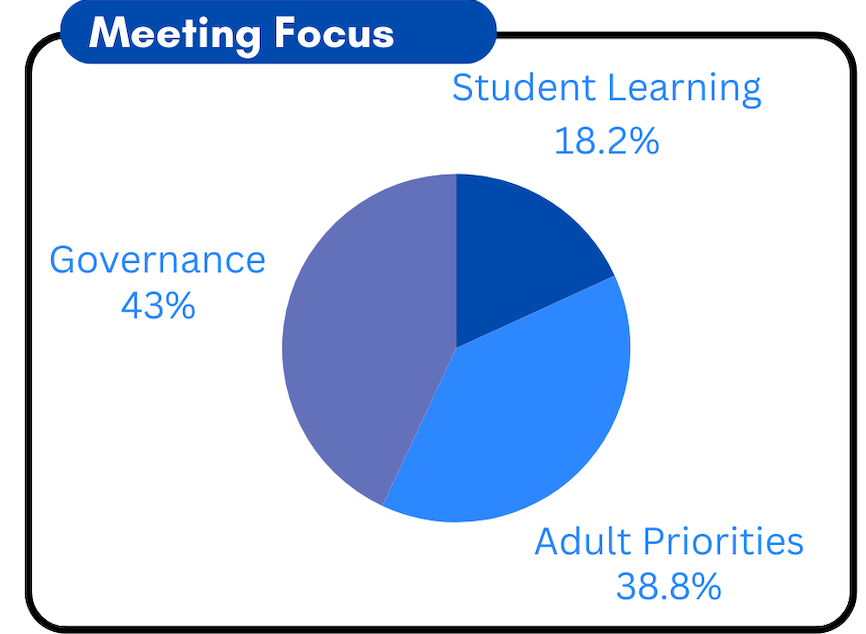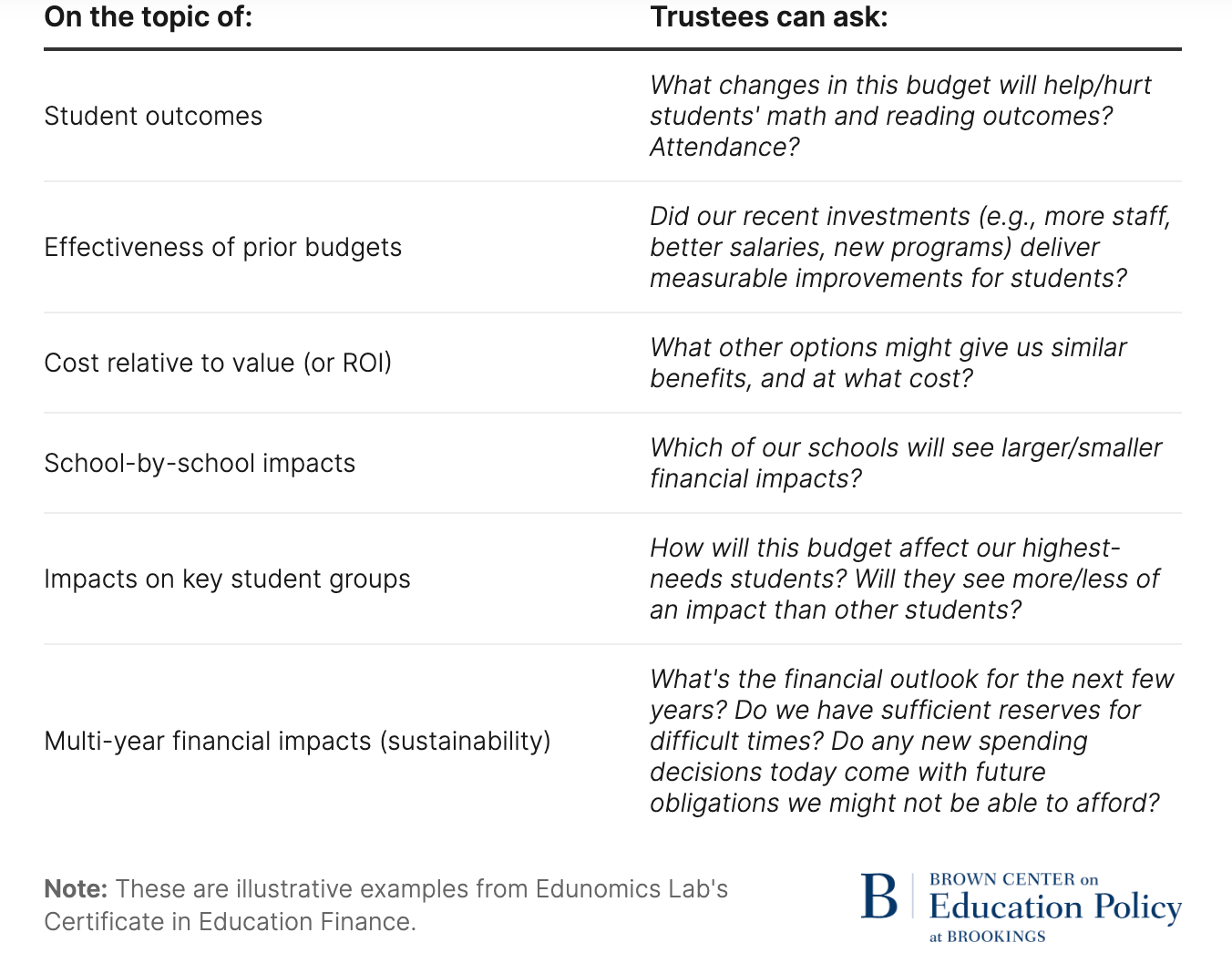Grading the School Board
In its first three months in office, the Chicago Board of Education spent just 18% of its public meeting time discussing student learning.

Education consultant, Chicago Public Schools parent, and recent Chicago Board of Education candidate Adam Parrott-Sheffer has been tracking who speaks and what they say at school board meetings. He graciously shared his first-quarter findings with Board Rule and explained his methods. "Public comment is the easiest part to do," Parrott-Sheffer observed. He can code comments in real time since speakers quickly identify themselves and their topics.
In the board's first three months in office, nearly half of public comments focused on charter renewals, and another 17% of comments focused on the proposed Acero charter school closures. There are clear reasons these topics drew speakers to the board meetings: it's charter renewal season, and the Acero situation is urgent for parents. Yet charters only serve about one-fifth of the students in Chicago Public Schools.

To trace the amount of each board member's speaking time and types of comments, Parrott-Sheffer rewatched the meeting, using YouTube's transcript and timestamps. Classifying board members' comments as questions, affirmations, or critiques was relatively simple.
Sorting the whole meeting's discourse into high-level categories proved more challenging. "The student learning versus governance versus adult stuff" was most open to interpretation, Parrott-Sheffer noted. Governance included "anything about their votes, about a particular policy, the work of supervising the superintendent or maintaining the district." Conversations about student learning focused on classroom-level issues and academic outcomes, such as a recent presentation to the board on the postsecondary outcomes of CPS graduates. The "adult priorities" category served as a catch-all for procedural remarks, recognition of outstanding students and staff, comments from board members that Parrott-Sheffer deemed tangential to the issue under discussion, etc.

Parrott-Sheffer hopes his analysis will encourage other Chicago board-watchers to examine how the board goes about its public business. "Wouldn't it be great if other people got curious about the data and took another lens at it?"
What Good Budget Questions Could Look Like
Spring budget season offers a prime opportunity to see how school boards discuss their spending decisions. Recent research suggests that many have room to grow in their budget deliberations.
For a paper published in March by Brookings, a nonpartisan think tank, researchers Marguerite Roza, Margaret Green, and Laura Andersen analyzed hundreds of hours of budget deliberations in 174 school districts, including Chicago, recorded during the 2021-22 school year. They found the average budget discussion lasted 40 minutes, and school district staff generally took up much of the air time. Only about a third of the meetings discussed sustaining budgets beyond one year, and less than one-quarter considered the impact of school budgets on student outcomes. Even smaller shares of meetings included discussions about the effectiveness of prior budgets or tried to examine returns on investment.
The researchers recommended that more states establish minimum financial training requirements for school board members. Illinois already requires all school board members to take online training which covers finances as part of a larger curriculum. Board members must complete the training within their first year of service.
The researchers also offered a set of possible questions school board members could pose during public discussion to go deeper into the trade-offs involved in budgeting.

If any Board Rule readers want to track how the current Chicago school board discusses budgets, or any other topic, please reach out to me at maureen.boardrule@gmail.com.
Previewing Today's Agenda Review Committee
What's on the tentative agenda for the April board meeting? The biggest visible items are: contract renewals with the nonprofit community-based organizations that support Sustainable Community Schools, charter school renewals, and the lease renewals for building hosting charters (many of which are owned by the Archdiocese of Chicago).
What's not on the agenda...yet? The budget amendment to fund the pending contract with the Chicago Teachers Union. That amendment won't be added to the agenda until after the CTU membership ratifies the deal.
The Black Student Achievement Committee is also not on today's agenda but is likely to be on the board's April 24 docket. Last week, I ran into board member Jitu Brown at CTU headquarters for the official book launch of Karen Lewis's memoir, I Didn't Come Here to Lie. Brown said a resolution establishing the committee will be presented at the April 24 board meeting.
Board Books: What They're Reading
The unmistakable voice of former CTU President Karen Lewis resounds through I Didn't Come Here to Lie, the memoir she wrote in collaboration with historian and former school board member Elizabeth Todd-Breland. After Lewis' untimely death, Todd-Breland organized and shepherded the manuscript to publication.
Readers will enjoy the recounting of her run-ins with Mayor Rahm Emanuel. They'll hear Lewis' take on the origin of the Caucus of Rank and File Educators (CORE) and the people involved from the start, including current board member Debby Pope. Lewis' memoir also touches on CORE's deliberate efforts to build relationships with community groups, from the Kenwood Oakland Community Organization (where board member Brown worked for many years), to the Brighton Park Neighborhood Council to the Logan Square Neighborhood Association, now known as Palenque LSNA (where board member Norma Rios-Sierra currently works).
Back in March, board members who missed their training session with the UChicago Consortium on School Research received copies of How a City Learned to Improve Its Schools. Published in 2023, this collaboratively-authored book tells the story of how Chicago Public Schools went from "worst in the nation" in the late 1980s to one of the nation's fastest-improving large urban districts today. As two of the co-authors, Anthony Bryk and Sharon Greenberg, wrote for the Phi Delta Kappan, solid research evidence helped district leadership identify and stay focused on effective strategies for change, from strengthening principal leadership to ensuring ninth-graders complete their first year of high school on track to graduate. This research was made possible by CPS leaders' willingness to share data with the Consortium researchers, an unusual act of courage for a school district.
Taken together, the two books offer a comprehensive view of education in Chicago over the last few decades. While Karen Lewis offers a frank look at some of the forces beyond the school walls and her union's challenge to them, the Consortium authors present the subtle, steady work done by educators partnering with researchers to improve teaching and learning for Chicago kids.
Back in Town: Dolly Parton's Imagination Library
Thanks to Share Our Spare, the CME Group Foundation, and the Robert R. McCormick Foundation, board books of the early childhood kind--and more--are once again available through Dolly Parton's Imagination Library for children from birth to five in 10 Chicago ZIP Codes: 60608, 60619, 60620, 60621, 60623, 60624, 60632, 60636, 60644, and 60651.
The Imagination Library sends each enrolled child one book a month (to keep) from birth through age 5. Share Our Spare leads the work of enrolling young children and their families. To learn more about how to enroll families, contact bridget@shareourspare.org.
Coming up: Later this month, I'll be speaking with Board President Sean Harden. Send me your questions! Board Rule is also open to more analysis like today's observations from Adam Parrott-Sheffer. Send your announcements, questions, and news tips or commentary ideas to maureen.boardrule@gmail.com.
Comments ()